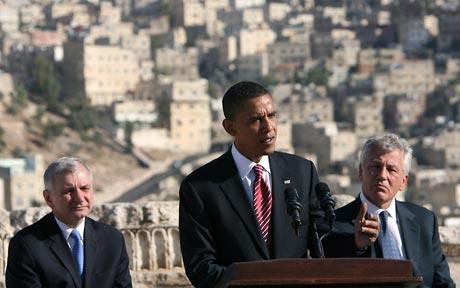The choice that he has to make is to work with authoritarian regimes that could reinforce their position or to engage in policy actions that could empower the peoples of the region to determine their destiny free of internal tyranny and external hegemony.
The historical gulf between the rulers and the ruled has never been wider in the Muslim states of the region, although in some cases various devices, such as elections and legislative processes, have been deployed to conceal it.
All the rulers have come to power without any public contest and freedom of choice, although the Afghan, Pakistani and Iraqi leaderships, as well as the Iranian regime to some extent, have been able to forge more electoral legitimacy than others. As a result, the rulers have taken one policy direction and their subjects another, with the distance between them widening.
No recent examples have reflected this state of affairs more than the reaction of many Arab countries to Israel’s 2006 and 2008 assaults on Lebanon and Gaza respectively. While the Arab streets widely supported the resistance mounted by the militant Lebanese Hezbollah and its Palestinian counterpart, Hamas, most Arab regimes were not in accord with the sentiments of their publics.
This state-society dichotomy entails a serious challenge to Obama to reach out to Arab and Muslim peoples, and open the clinched fist of not only those few regimes that have grown hostile to the US, but also the ones that have had close relations with the US. The dilemma confronting Obama would be two-fold. One is that for a resolution of the regional problems he would need to rely on the regimes for their co-operation and therefore confirm legitimacy upon them. This is something that they would seize upon to strengthen their grip on their societies. The other is that if he seeks to respond to the wishes of Arab and Muslim societies in pursuit of empowering the people to determine their destiny, he would seriously risk losing the co-operation of the regimes, jeopardising his chances of making meaningful progress in solving various regional conflicts. The question then is what is to be done?
It is imperative for Obama to have a two-pronged strategy. On the one hand, he should engage the regimes for short-term objectives to settle regional disputes and stabilise the region from Pakistan to Palestine. On the other hand, he will need to design his processes of engagements and conflict resolution in ways that could pave the way for some long-term objectives: to move the regimes towards loosening their authoritarian control in pursuit of building and expanding the necessary basis for the growth of civil society and liberty as foundations for democracy.
However, Obama must not aim at replicating George Bush’s agenda for exporting democratisation as a means to change the region in the image of the US. That policy has already cost thousands of lives in Iraq and Afghanistan, denied Hamas its right to exercise power as the democratic choice of the Palestinian people, and therefore led the US to have contradictory dispositions in the region. In inducing dictatorial regimes to unclench their fists, he should use whatever diplomatic and economic means at his disposal to engender liberal changes from within those societies to meet the expectations of the people on the basis of their own traditions and cultures.
Beyond these, Obama may find himself with no choice but to restrain Israel from pursuing a policy of confrontation with the Palestinians and regional states as the basis for ensuring the security of the Jewish state. This requires a restructuring of the US-Israeli strategic partnership, which has too often made the US pursue a double standard policy in the Middle East: one for Israel and another for Arabs.
If Obama succeeds in cutting across the state-society dichotomy in the region, together with constraining Israel, he stands a reasonable chance of succeeding in his goal of reaching out to the Muslim world. Otherwise, he is at serious risk of being caught in the same complexities that marred the policies of his predecessors, especially George Bush.
Amin Saikal is Professor of political science and director of the Centre for Arab and Islamic Studies (the Middle East and Central Asia) at the Australian National University. This piece originally appeared in The Age, March 9th, 2009.

